
Related
Guests
- Malik ShabazzMegan Williams’s lawyer. He’s also the co-founder of Black Lawyers for Justice and the leader of the New Black Panther Party. He helped organize the hate crime awareness march in Charleston on November 3rd. Malik Shabazz joins us from Washington, D.C.
- Luz Marquezassociate director of the National Organization of Sisters of Color Ending Sexual Assault, also known as SCESA. She was at the march in Charleston and met with Megan Williams. She also helped organize a national campaign to draw attention to both Megan Williams, as well as other cases of assaults against women of color. The campaign is called Document the Silence. Luz Marquez joins us on the phone from Troy, New York.
- Herb Boydactivist, teacher, author, and journalist. He edits the online publication The Black World Today and writes for several publications, including Amsterdam News.
Noose incidents and violent attacks illustrate an alarming increase in overt racist symbolism and violence across the country. We speak to Malik Shabazz, lawyer for an African-American woman in West Virginia who was kidnapped, tortured and raped by six white captors. We’re also joined by Luz Marquez of the National Organization of Sisters of Color Ending Sexual Assault, and activist, teacher, author, and journalist Herb Boyd. [includes rush transcript]
Transcript
AMY GOODMAN: We turn now to a discussion on the alarming increase in overt racist symbolism and violence in this country. As the case of the Jena Six entered the national spotlight, cities and towns across the United States have witnessed a spate of copycat noose hangings in public places. Diversity Inc. magazine reports at least 45 noose incidents since October 30.
We begin, however, with a story that’s received less media attention than the noose incidents. This September, a 20-year-old African-American woman in West Virginia was kidnapped, raped, tortured, held captive for over a week by six white men and women. I’m talking about Megan Williams. This is an excerpt of how she described her ordeal to the Associated Press in October.
MEGAN WILLIAMS: They were torturing me. They all passed a knife around that was — and stabbing me. I was trying to get away as they were stabbing me, and they were holding me down and stuff. And they smothered me with a bag. That morning, I had a bag wrapped around my neck and everything. They choked me. They made me eat dog poop, rat poop and human. They made me drink their urine. And each time, they braided some switches together, and they were beating me across the back. They tore my clothes off me and everything.
And then they took me up to a lake. They said that was the place they were going to cut my throat and throw me in, and I was never going to come back and see my family again. They were just telling me that they were going to kill me.
And, you know, I was — they made me take a bath in a trash can. They wouldn’t let me use the bathroom. I had to use the bathroom outside. I had to sleep outside. And they told me if they even remotely heard me once, that they would go out there and kill me. They poured candle wax in my hair. They pulled my hair out when they were cutting it with scissors. And, you know, they were just scary.
They had me tied up. I couldn’t go anywhere. Like the time when they left, they were going to go get some beer and stuff, and when they came back they said they were going to finish me off. And before they even got back, I had already got loose. I found a knife and cut myself loose.
I heard the police coming up to the driveway. When I’d seen the police, I just — you know, I knew it was, you know, my chance to get out. And if I didn’t, I was going to die anyway. And then, that’s when they see me coming out there, and they thought — they said I was going to lose my leg, when they see about the stabs. And I was scared. I didn’t know what to do. All I kept saying — I was thinking about my momma, also wanting to come home. And every time I close my eyes, all I see is that knife, the one they kept stabbing me and stabbing me. It’s just — you know, it’s a nightmare.
AMY GOODMAN: Megan Williams, speaking to reporters last month.
Local authorities say she was kept captive in a shed, tortured, beaten, forced to eat rat, dog and human feces, raped by six white men and women, who taunted her with racial slurs. Prosecutors have charged the six suspects with rape, kidnapping, but not hate crimes.
Early this month, hundreds descended on Charleston, West Virginia for a march to persuade prosecutors to charge the suspects with committing a hate crime against Megan Williams.
Malik Shabazz is Megan Williams’s lawyer. He is also co-founder of Black Lawyers for Justice, a leader of the New Black Panther Party, helped organize the hate crime awareness march in Charleston on November 3. Malik Shabazz joins us from Washington, D.C.
Welcome to Democracy Now! Can you tell us about the latest in the case of Megan Williams?
MALIK SHABAZZ: Yes. The latest in our efforts to secure justice for Megan Williams means that we’re following up on our march. We don’t just have marches for symbolic reasons. We were able to raise $5,000 in our goal of raising $20,000 to help comfort her in this hour. We’re continuing to fight for hate crime charges to be established in this case on a state and a federal level. There is some movement. We’re continuing to provide legal assistance for her in other areas at this hour.
We’re also working with other groups in the community, working with groups, such as Sisters of Color Ending Sexual Assault, to provide really what Megan needs right now, and that’s wraparound help, wraparound services to help her to get better. And so, we’re fighting on various fronts to keep following up and fighting to raise the voice and the issue of this case, which is being swept under the rug.
AMY GOODMAN: Malik Shabazz, you spoke with the U.S. attorney in the area, Charles Miller?
MALIK SHABAZZ: Yes.
AMY GOODMAN: What did he say?
MALIK SHABAZZ: He gave a lot of excuses of why hate — federal hate crime charges, or what’s called conspiracy against constitutional rights, had not been filed in the Megan Williams case. He claims he tried, but he was being rebuffed by the Bush-led U.S. Department of Justice Civil Rights Division. I can believe him on that point.
The United States Department of Justice — we commonly refer to it as the United States Department of Injustice — it vigorously attacks the civil liberties, civil rights, the human rights of those that they suspect of so-called terrorism. It advocates the wiretapping of private citizens, the intrusion of bank accounts. It advocates violating the rights of prisoners abroad and at home under the guise of fighting terrorism.
But when terrorism comes against our people here, and it’s continuously occurring, as in the case of Megan Williams and other cases, the United States Department of Justice Civil Rights Division has its hands tied. They won’t do anything. And they simply don’t care. So, yes, it’s coming out of Washington. I lay the responsibility on the president of the United States, George Bush, and his politically motivated United States Department of Justice, which simply does not care about our people and our rights and our calls for justice.
AMY GOODMAN: Luz Marquez is the associate director of the National Organization of Sisters of Color Ending Sexual Assault, also known as SCESA. She was at the march in Charleston, met with Megan Williams, also helped organize a national campaign to draw attention to both Megan Williams, as well as other cases of assault against women of color: the campaign called Document the Silence. Luz Marquez joins us on the phone from Troy, New York.
Welcome, Luz. Can you talk about this case and others you see are not getting the kind of attention they need?
LUZ MARQUEZ: Sure, sure. Good morning, Amy. Good morning, Brother Malik. Yes, there are several other cases that we are following. And I should tell you, sort of looking at a historical view of what happens to women of color when they’re violated sexually or victims of domestic violence in this country, there seems to be a discrepancy in the response by both law enforcement, media, as well as community support. And so, the callout that we did in West Virginia was successful, in that folks are no longer afraid or think that talking about sexual assault is taboo, that we need to talk about it to put an end to it.
But I do want to draw attention to Florida, as well as New Jersey. Florida, in the West Palm Beach area of what’s called Dunbar Village apartments, there have been, since June 18 of 2007, this year, there have been five rapes. The worst was of a Haitian woman and her son, who for three hours were raped and sexually assaulted by a gang.
Since that case has happened, we have seen little to no media attention of the issue of rape in hate crimes, as well as failure to protect. I think with all of these cases, what we see is there is a failure to protect, whether it be from the housing authority or from law enforcement, and what have you.
Since the rape of this Haitian woman and her child, who I should say they received torture and just unbelievable assault, there have been three other rapes of a 15-year-old in the middle of a day, of a 42-year-old just early in the evening, and then in New Jersey, very much similar to the Jena Six case, there were seven women of color lesbians who were walking in what they presumed to be a safe haven in the West Village of New York, a for-LGBT community. They were stopped and sexually harassed by a stand-byer who proceeded to tell them exactly what he was going to do to them sexually, how he was going to do it. He proceeded to follow them. They ignored him. They told him to stop, go away. He then proceeded to tell them specifically every detail of what he would do and then proceeded to touch one of them in her buttocks. And when she went to stop him, a fight brawled out.
And needless to say, four of these seven women are serving time in Bedford Women’s Correctional Facility in upstate New York, which is a shame, because they were defending themselves. And so, what we see at the National Organization of Sisters of Color Ending Sexual Assault is a huge disparity amongst what happens when a woman of color is violated, whether or not she protects yourself, what happens, and an equal-to protection on behalf of folks who are supposed to protect them.
AMY GOODMAN: Luz, we’re also joined here in the firehouse studio in New York by activist, author, journalist, Herb Boyd, who edits the online publication Black World Today. Welcome to Democracy Now!, Herb.
HERB BOYD: Thanks, Amy.
AMY GOODMAN: Your assessment of what is happening now, these situations and the coverage that they’re getting?
HERB BOYD: I think one of the things that we’re recognizing, Amy, is that we’ve had all these nooses, the prevalence of nooses, proliferation of nooses out here, we’ve gone from symbolism to action. I mean, the nooses is obviously a symbol of terrorism. I mean, if you put it in historical context, we go back to 1882 to 1951, something like 5,000 people were lynched in this country.
One of the difficulties with all of this, with the prevalence of nooses, is the separating the kind of racial predator, you know, from the kind of mischievous prankster. You know, to what extent is the copycat thing out there? But more than anything, we’re talking about a systemic malevolence here, you know, all across. I mean, each day we see a new incident of a noose finding. What is it all about? You know, it’s like people asserting their authority. You know, it’s just a way of like “We’re still in control of black bodies in this country.”
AMY GOODMAN: Malik Shabazz, as we wrap up, I asked you about the U.S. attorney, Charles Miller, why they haven’t filed hate crimes charges against the six. What about the Logan County prosecutor, Brian Abraham, in West Virginia? According to the Amsterdam News, he has not ruled out state hate crimes charges, in addition to the kidnapping and first-degree sexual assault charges he’s already brought against the six white suspects.
MALIK SHABAZZ: And that’s why we continue our legal advocacy, and we’ll pursue it vigorously. We know that this is, at minimum, a state hate crime, and this must be established. West Virginia is a 98 percent white state; they’re 2 percent blacks. The filing of hate crime charges in this case will ensure the broader protection of blacks in the state.
And so, we will continue to fight vigorously, and I expect to see progress in that area and in general. I think we have to, and we will, from my perspective, and those that are with us and fight with others, because I believe that the hanging of nooses is a sign that there will be real bodies under those nooses very soon. I believe that this is just a first level of increased racial violence and violence against women.
AMY GOODMAN: Malik Shabazz, there is going to be a protest on November 16 in Washington, D.C. against racial violence?
MALIK SHABAZZ: There is. I think that’s Reverend Sharpton’s protest. And I think in order for him to be successful in general, he has to make a real effort to fight with those that are really fighting on the ground in that struggle. If he’s really going to make progress, and I hope he does, he has to seriously be sincere about working hand-in-hand with those that are fighting these issues of racist violence and gender violence.
AMY GOODMAN: I want to thank you all for being with us, Malik Shabazz, attorney for Megan Williams, also the co-founder of Black Lawyers for Justice; Luz Marquez, associate director of the National Organization of Sisters of Color Ending Sexual Assault; and journalist Herb Boyd. Thanks so much for joining us.
HERB BOYD: It’s a pleasure, Amy.

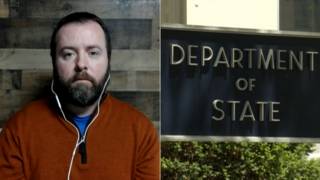
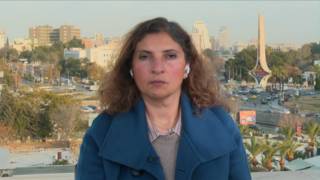
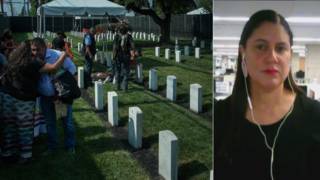
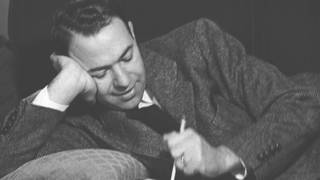





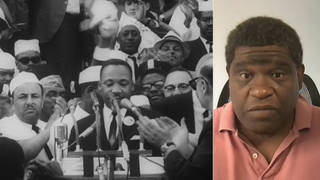
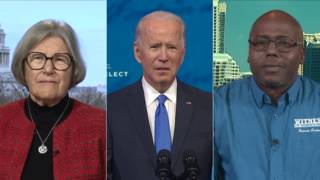
Media Options